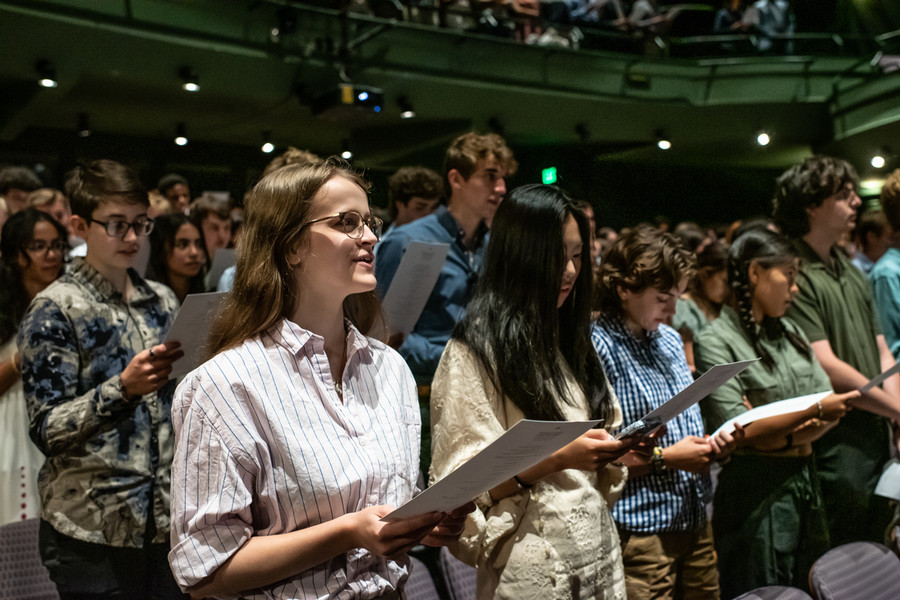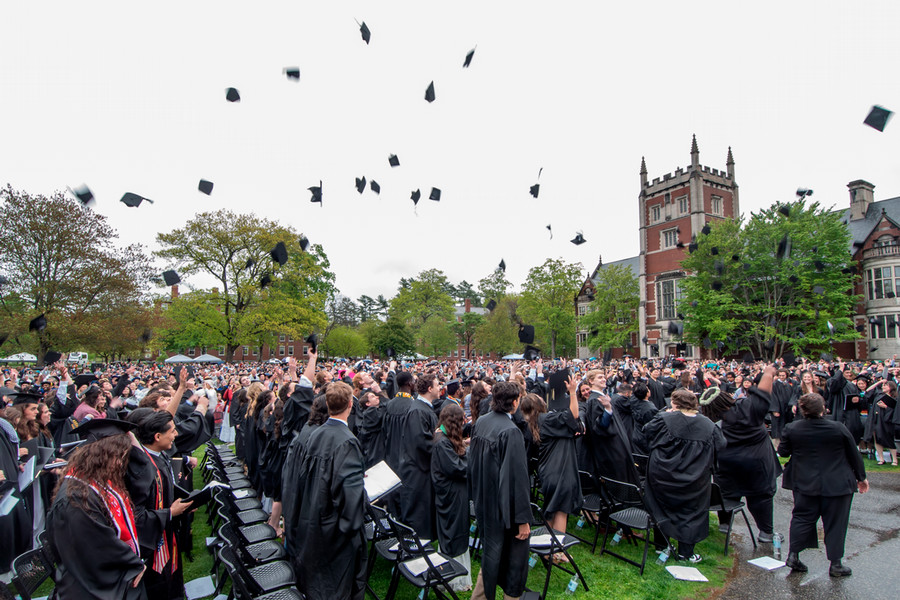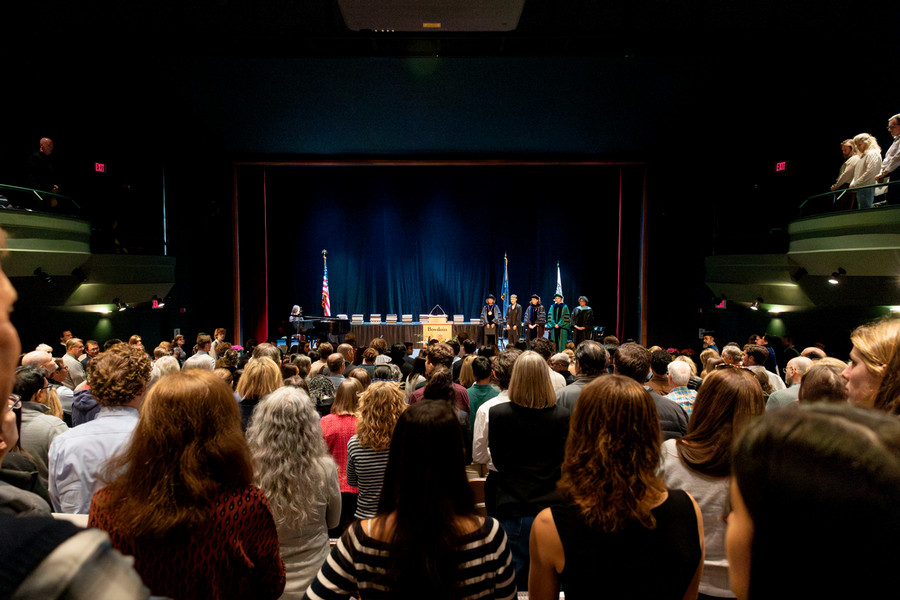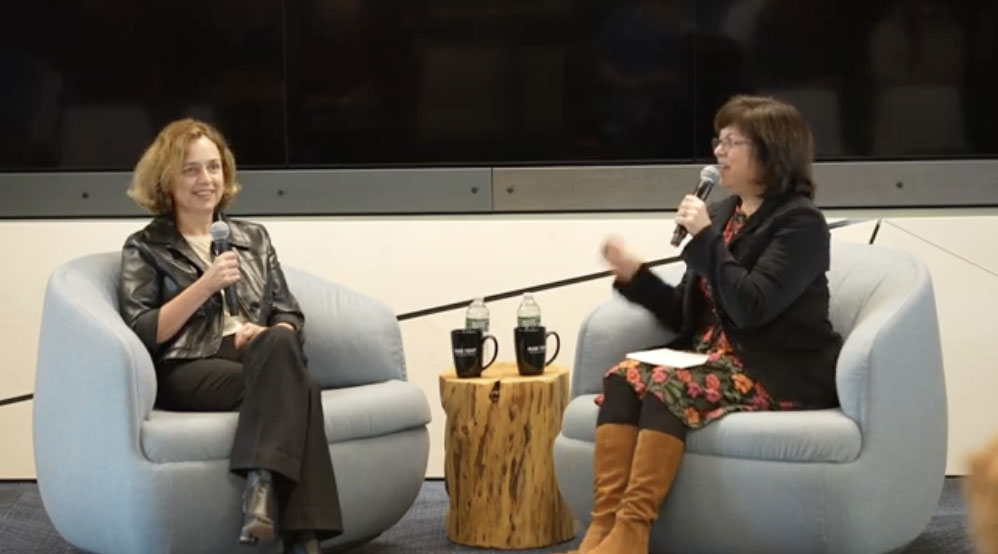President Safa Zaki: Commencement Remarks 2025
Good morning, Class of 2025!
I am so happy to welcome all of you—trustees, faculty, staff, honorary degree recipients, family and friends from all over the country and the world–to this wonderful event where we can honor and celebrate the accomplishments of the class of 2025. I want to begin by thanking our incredible faculty and staff for everything they do every day to support our students.
Over the past few days, it has been so heartwarming to see members of the class of 2025 with the people who hold them up, people who mattered so much on their journey.
Parents, stepparents and guardians, please stand if you are able so we can recognize you.
Grandparents, please join them.
Now, siblings, aunts and uncles, cousins, other family members I haven't named,...please join them as well.
We are all so grateful for you.
Class of ’25: When you arrived here in the fall of 2021, you entered a Bowdoin that was navigating new ways of living and learning together in a world transformed by covid. You did that difficult work together, with grace, curiosity, humor, and patience—well, most of the time. In that process, you learned from each other, you listened to one another, you challenged each other, you made Bowdoin yours.
You are graduating Bowdoin ready to navigate new ways of living and learning in a world full of profound challenges that we did not anticipate four short years ago.
I know that these challenges seem overwhelming and sometimes even frightening; The world you are entering might seem uninviting. Perhaps this even feels like an incongruous moment to celebrate.
But today IS a day to celebrate. Rather than being overwhelmed, I hope you will accept what might seem like an uninviting invitation with confidence and excitement; I want all of us to celebrate your accomplishments over the past four years, and to celebrate the people sitting around you who made those accomplishments possible.
Let me touch just briefly on those accomplishments. Sitting among your class are recipients of national fellowships; published authors; accomplished artists and athletes; and so many community leaders and activists.
Over the past four years, some of you have become fluent in a new language; some have contributed to scientific discoveries; some of you have composed original pieces of music or created beautiful works of art; some have read books that fundamentally changed your worldview; some of you produced original works of scholarship; some of you have competed in national championships; some have spent hours volunteering on campus or in the community; all of you have built life-long capacities and relationships.
I hope that highlighting how much you have learned and accomplished in these four years, while acknowledging how nervous you may have felt as you sat in Pickard Theater at your convocation as entering first years, will remind you to give yourself time to navigate your next transition.
During these same four years, many of you have likely stumbled, perhaps more than once. Maybe you struggled through, or even failed, a class; maybe you have a regret about something you did in a friendship; maybe you made a wrong decision now and again; maybe you are questioning whether you had the college experience you had hoped for. I want you to know that these struggles, regrets, wrong decisions, and lingering questions do not predict or determine your future–they are opportunities to reflect on and recognize what can be overcome.
As you have likely heard about since your arrival, and heard a bit about yesterday in Tom Putnam’s remarks at Baccalaureate, the class that graduated 200 years before you, the class of 1825, is a famous class. That class is largely celebrated for the unlikely fact that both Henry Wadsworth Longfellow and Nathaniel Hawthorne were in it.
Aside from Hawthorne and Longfellow, there were thirty-five other students in that class, including congressmen, prominent lawyers, and even a Navy Commodore. And then there were the lesser known students whose impact was felt, even if not often remembered.
One of those, David Haley Foster, was “constantly written up for neglecting his studies and being absent from obligations.” He began his career as a lawyer, but then became a “highly popular and successful” teacher of music and languages—a profession as impactful then as it is now. He ultimately set up a female seminary in Maryland.
Another, George Barrell Cheever, and I quote, “received some fines from the Executive Government for neglecting his work and missing prayers.” He went on to become an abolitionist minister.
Others who had more pristine disciplinary records but were not particular standouts as undergraduates went on to live lives of meaning and serving others. Joseph Jenkins Eveleth, began his career as a lawyer, but then moved home to Augusta to care for his aging parents and devote himself to community work, becoming a city leader and supporter of the area’s orphans and widows.
Another graduate, Eugene Weld, became a doctor who dedicated himself to treating poor patients with cholera in Louisiana.
I describe these four lives briefly just to say that life is long, and that the choices you make in your early twenties do not necessarily determine the meaningful contributions that you will make over the course of your lives.
I asked our Director of Special Collections and Archives, Kat Stefko, who has worked so hard on the history of this class what made them so special, and her answer emphasized the connections and relationships they had with each other.
It may have been unlikely that Longfellow and Hawthorne and their fellow students were in the same graduating class. But I have to say that the astonishing distribution of talent in this class, the class of 2025, is equally unlikely. So too is the astonishing depth of the relationships you have with each other and the kindness you show to each other–those qualities make it possible for all of you to take risks, to try new and hard things, to excel so spectacularly.
The odds of having a community with so much talent in so many different areas are extraordinarily low. Seeing your class beat those odds has forced me to repeatedly change my prior assumptions. In my field of computational cognitive science, we often use a Bayesian method of analysis, which essentially is a way to calculate the probability of a hypothesis, given prior evidence, and then to update the hypothesis based on new information.
It may be stretching the meaning of the term, but allow me to play with this method as a metaphor for thinking about your class. Seeing the work you’ve produced and the community you’ve built has—again and again—challenged my prior assumptions about what is possible.
Let me tell you a quick story about something that happened recently as a way of illustrating what I mean.
Last month, I attended a concert where performer after performer, band after band, just blew my mind. Every single performance was spectacular, and I was completely transported. After the concert, in conversation with several students, I told them that I had been writing my commencement speech in my head, thinking about how to communicate the ways that one concert made me—once again—readjust my priors higher.
I say "once again because", I’ve seen you in your performances, art exhibitions, a capella and dance concerts, your fashion shows, your research presentations, and athletic events; I’ve heard your faculty rave about the work you do in their classes. As I've gotten to know you, through conversations in dining halls and in my office, I’ve had to regularly readjust my priors to expect the extraordinary.
As I look at the challenges that we are all confronting, I want you to know that the thing that gives me the most confidence in and comfort about the future is you. Unprecedented challenges require an unlikely generation. I’ve seen you all do extraordinary things; I know what you are capable of. I know this by observing the combination of accomplishments and stumbles I’ve described, by observing your commitment to each other and to the larger community, by observing your curiosity about and care for the natural, artistic, and political world; by observing your willingness to give each other—and most importantly yourselves—second chances to try again. No matter what you go on to do, it is those qualities of thinking and those values of living that I hope you will draw on throughout your lives.
To the Class of 2025: please accept our congratulations, and please know how proud of you we are. Truly, I can’t wait to see what you do next. I will close by saying what I said last year, and what I will say at every commencement because I feel it so deeply: please come back and visit–this place is yours, forever.
Back to the Commencement recap »



